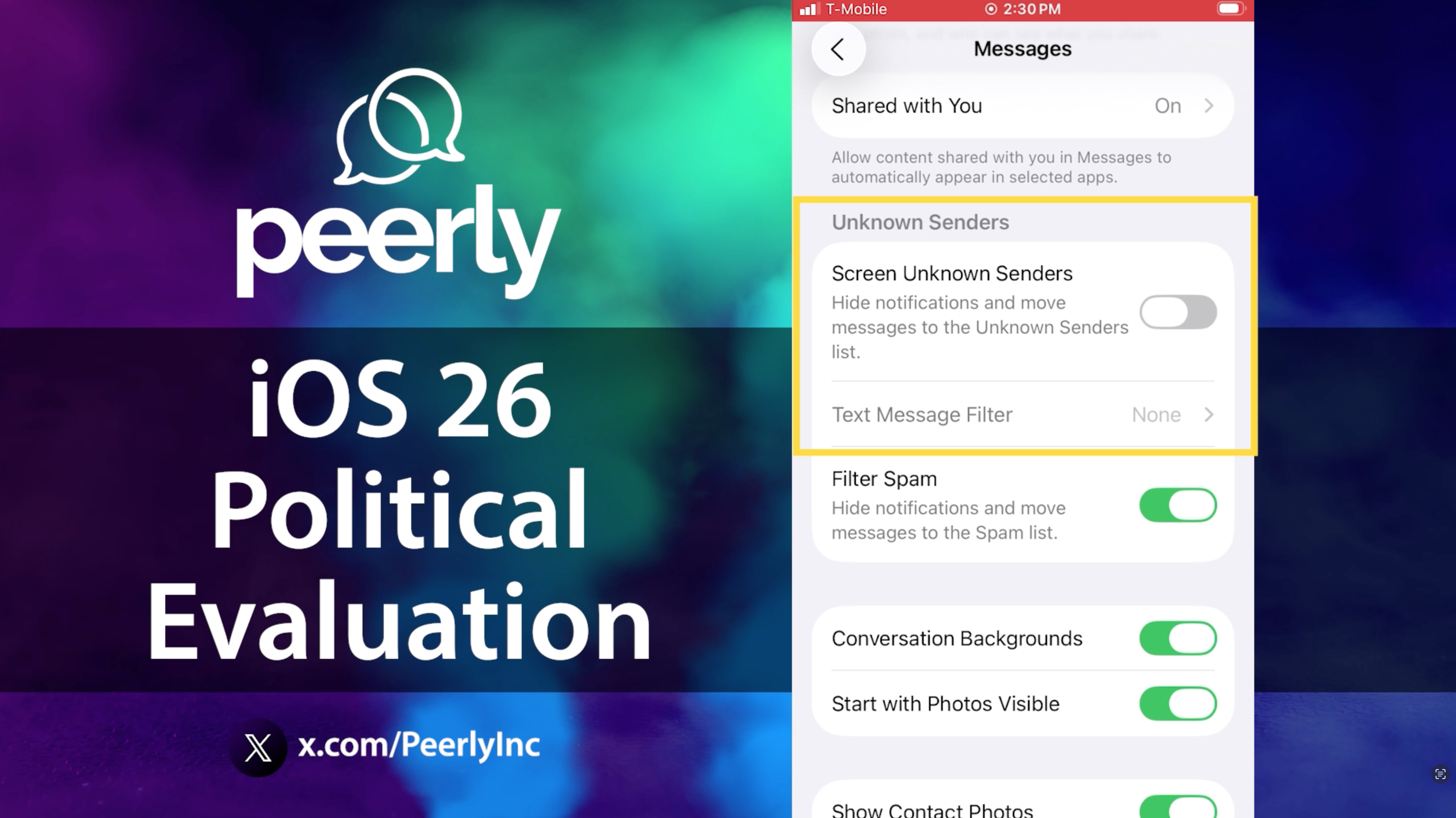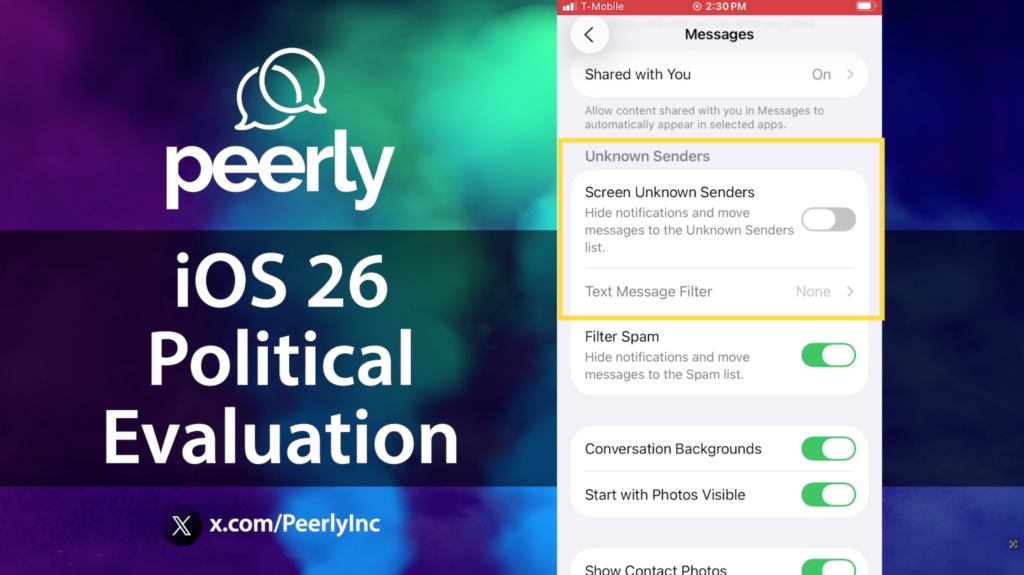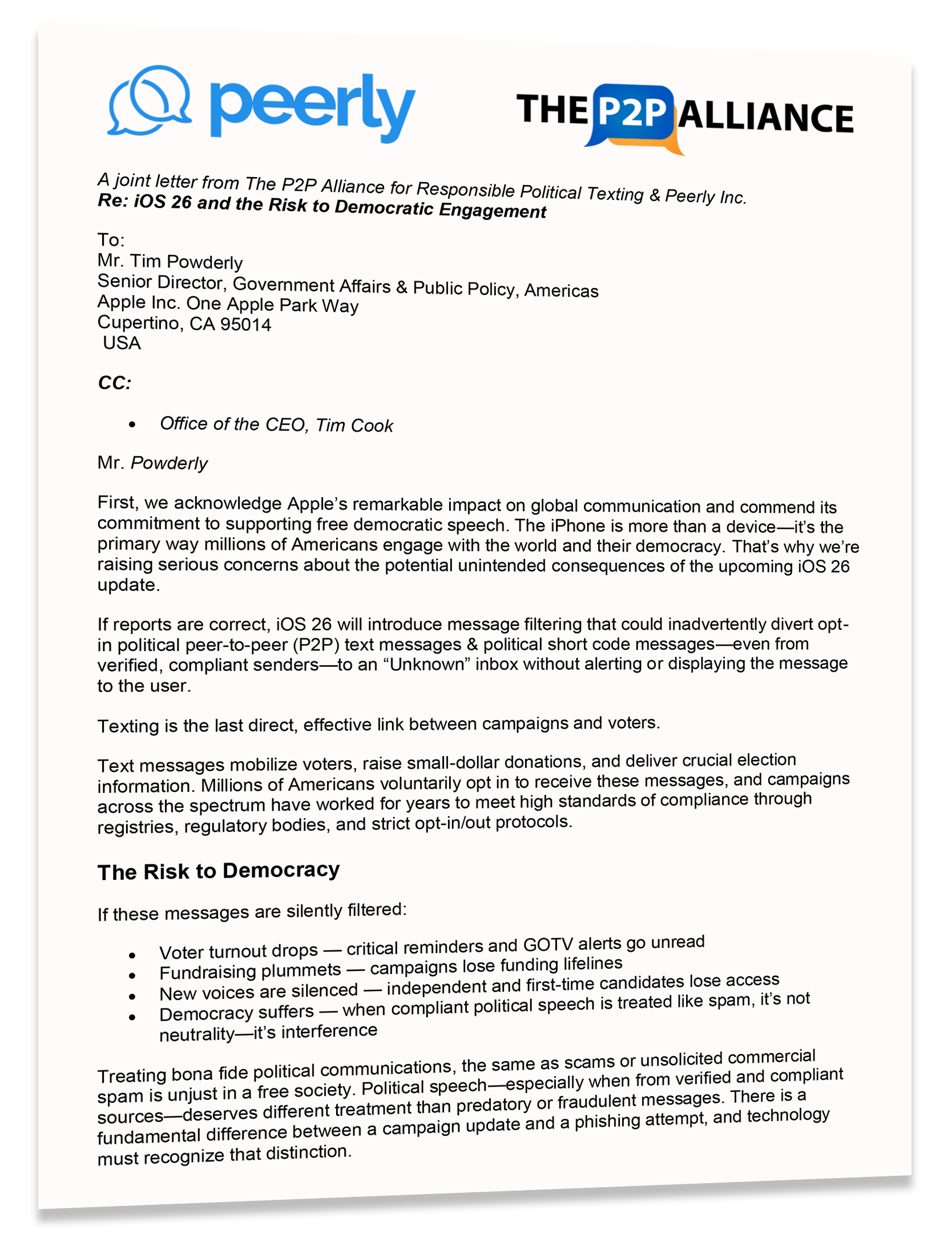
How Apple’s Update Could Disrupt Democracy and Countless Critical Messages Across the U.S.
In today’s political landscape, text messaging is one of the last remaining direct, democratic tools available to campaigns. As television fades, radio fragments, and social media platforms tighten political access or ban ads altogether, Peer-to-Peer (P2P) texting has become the lifeline for candidates looking to reach voters personally and at scale.
But that crucial line of communication is now at serious risk.
Apple’s iOS 26: A Powerful Update With Unintended Consequences
According to recent reports and public beta evaluations, Apple’s upcoming iOS 26 introduces new call and text filtering options. One of them, “Filter Unknown Senders,” could automatically divert political messages into a hidden inbox without the user ever knowing a message arrived. No push notification. No badge. No lock-screen alert.
For a voter, that means they may never see a reminder to register, an invitation to a town hall, or a final get-out-the-vote text.
For campaigns, especially small, new, or independent ones, this could cripple outreach, fundraising, and visibility overnight.
Important: This change isn’t coming from the government or the carriers. It’s coming from a private software update, and it could reshape the entire democratic outreach model for the 2026 cycle and beyond.
Peerly’s Hands-On Evaluation of iOS 26
In a recent podcast, Peerly’s executive team publicly reviewed the iOS 26 public beta.
Hear firsthand how these changes could impact political speech, campaign communication, and voter access.
At Peerly, we believe in facts, not fear. That’s why our engineering team conducted a full review of the public beta of iOS 26.
Here’s what we found:
- “Filter Unknown Senders” is off by default in the current beta version.
- “Filter Spam” is on by default, consistent with prior iOS releases.
- Political messages from verified, compliant senders currently do not appear to be filtered unless the user manually enables the “Unknown Senders” filter.

That’s good news, for now. However, multiple industry reports and public concern suggest this setting may be turned on by default in the full release. And if that happens, messages from trusted, opt-in political sources could disappear without a trace.
This is why we’re urging Apple to keep this feature opt-in at minimum, or better yet, pause its deployment entirely until its full impact on voter communication can be assessed.
Why This Matters: Half the Country Is on iPhone
This is not a niche issue. Over 50% of U.S. voters use iPhones. For many, it’s their only communication device. If this feature rolls out with default filtering, half the electorate could unknowingly be cut off from democratic dialogue.
This affects everyone:
- Voters, who will miss critical election deadlines and event information.
- Campaigns, who will lose their most effective fundraising and mobilization channel.
- The public, who may no longer receive important texts from nonprofits, schools, or healthcare providers that also fall under “unknown sender” filtering.
Political Texting Is Not Spam, It’s Heavily Regulated, Verified, and Compliant
We support Apple’s ongoing efforts to combat spam and protect users. That mission is important, and we share it.
But political messages are not spam. They are already subject to some of the most stringent rules in modern communications, including:
- Federal Election Commission (FEC) oversight: Most campaigns must file official disclosures and obtain FEC IDs before they are allowed to send texts.
- The Campaign Registry (TCR): Verifies sender identity and ties them to registered political entities.
- Campaign Verify: Requires government-issued documentation to confirm authenticity.
- Strict opt-in and opt-out rules: Recipients must consent to receive messages, and can opt out at any time by replying “STOP.”
- Audit trails and traceability: Every message is logged and tied to a verified sender.
This isn’t an unregulated industry. It’s a professionalized, compliant ecosystem that has done the hard work to meet carrier, legal, and ethical standards.
Outside of peak election cycles, political texting is rare, targeted, and opt-in. To treat it as indistinguishable from credit card scams or fraud attempts is inappropriate and unfair—not just to campaigns, but to voters themselves.
The Real-World Cost: Millions in Donations, Millions of Missed Messages
The NRSC recently warned that the iOS 26 change could cost Republican campaigns over $25 million in lost small-dollar donations. If you extrapolate that to include Democratic, nonpartisan, and local campaigns, the national impact could be in the hundreds of millions.
According to NRSC:
- Over 70% of all small-dollar political donations are driven by text messages.
- Political campaigns lose 65% of visibility when text messages are sent to filtered inboxes.
- 53% of voters and a majority of donors use iPhones as their primary device.
The potential harm isn’t limited to political fundraising. Schools, hospitals, and service providers who rely on SMS alerts may also be affected if their messages are routed to “unknown sender” folders by default.
Peerly and the P2P Alliance Are Taking Action — We Are Not Standing on the Sidelines
Peerly will be speaking directly with Apple’s Government Relation/Public Policy team this month to share our findings, express the industry’s concerns, and advocate for a collaborative path forward.
In partnership with the P2P Alliance for Responsible Political Texting, we have also submitted a formal letter to Apple urging that this feature remain off by default — or better yet, outright paused until further studies can be completed and that political messaging remain accessible, accountable, and transparent.
We believe Apple has no intent to stifle political speech. Their history shows a commitment to user privacy and American innovation. But as with any powerful technology, unintended consequences matter—especially when they affect democracy at scale.
A Call for Responsible Implementation
We’re not asking Apple to give political messaging special treatment. We’re asking for fair treatment.
Here’s what we recommend:
- Pause this feature until its implications on democratic communication are fully understood.
- At minimum, ensure the setting remains off by default.
- Recognize verified political senders, those vetted by Campaign Verify and TCR, as legitimate and distinct from spam.
- Work with the industry to ensure political texting remains compliant, transparent, and available to voters who want to receive it.
The Bottom Line
Political texting is not just a tactic. It is one of the last direct, open, and effective tools available to democratic voices in the U.S.
If Apple’s iOS 26 update proceeds with default filtering, it could silence lawful political speech, stifle fundraising, and reduce voter engagement — without users even knowing it.
It’s not too late to prevent that outcome.
NOTE: Peerly has relationships with members of Apple’s Public Policy and Government Relations team, and we are currently in constructive discussions; any updates or insights will be shared on our official X account. Stay tuned.
👉 Read Our Open Letter to Apple Here
Read Our Open Letter to Apple Here
Join us in calling for transparency, collaboration, and a firm commitment to protecting open political communication—because democracy depends on it.




